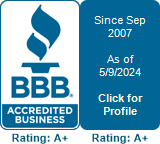
Moving to a new state can be a hectic, overwhelming time. But you can make it a little easier by understanding how it will affect your wallet and what you can do to make things go more smoothly. To help you with your move to North Carolina, here are five financial steps to take before and after you settle in.
Notify the IRS and Social Security Administration
Changing your address with the IRS and SSA will help ensure that any notices arrive in a timely manner since the IRS initiates all contact through the mail. If you need to get copies of any documents that you misplace during the move, the IRS will verify your identity and send mail to the address on file, as well.
Register Your Business in North Carolina
If you own a small business or are self-employed and file as a business, you'll need to register your business in North Carolina. Do this through the state's official website, NC.gov. As you probably with did with your previous home state, you'll need to do a business name search and register your choice with the Secretary of State. It's possible that your business name is not available in North Carolina, which means you should start this process early in case you need to make adjustments.
If you have employees or are responsible for sales tax, you'll need to create an account with the North Carolina Department of Revenue and learn how to calculate and pay sales tax or withholding taxes. This process varies state by state, so it may not be the same procedure as it was in your prior state.
Choose a Local Accountant
Even if you've done your own taxes before, it's usually a good idea to work with a professional in your new home state, at least for the transitional year. Why? If you had income (even passive income) in both your old state and your new one, you will likely have to file taxes in both states. Separating out the income, expenses and deductions between two states can be tricky, and you may find that if you DIY the job, you may leave money on the table.
Since state tax laws vary greatly, opting for a local accountant, such as Quality Bookkeeping Services Inc.,
will help ensure you have someone versed in North Carolina tax situations to help guide you through the transition.
Know Your Tax-Exempt Investments
Some investments have different tax status in different states. For example, local municipal bonds may be tax-free in the state where you live but not in other states. Moving your official residence early or late in the tax year can affect those tax rates, so go over your investment portfolio to determine how your move might affect your taxes. Talk with your accountant about any tax-advantaged accounts before the end of the current year in case you decide to change them or time the gains or losses.
Decide What to Do With Your Houses
When meeting with your North Carolina accountant, you may want to discuss what to do with your old house if you haven't already sold it. Some homeowners find it beneficial to continue renting their old home for the additional income. However, if you fail to use the house as your primary residence for more than two years, you may have to pay capital gains on the profit made when you eventually sell it.
Even with the capital gains liability, you may still decide it's wise to add rental income to your monthly budget. In this case, your accountant can help you learn how to save receipts and track both income and expenses for your income tax filings in the spring.
Whatever the reason that you're moving to North Carolina, using this checklist to make some tax related moves during the process can help you move with confidence and keep as much money in your wallet as possible.













